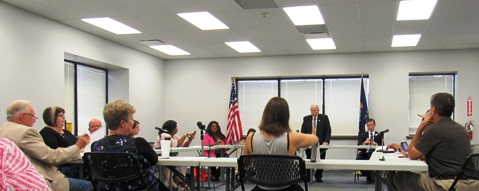by Jim McLean, Kansas News Service
Plenty of pundits are speculating that a Democratic takeover of the U.S. House would trigger impeachment proceedings against President Donald Trump.
But the Democrats attempting to flip three Republican-held congressional districts in Kansas aren’t at all eager to talk about the issue.
Paul Davis, Sharice Davids and James Thompson — Democrats running in the 2nd, 3rd, and 4th Congressional districts — haven’t hesitated to criticize the president for championing tax cuts they charge mainly benefited wealthy Americans and corporations, or the tariffs Trump imposed over objections from Kansas farmers.
But they’ve had relatively little to say about recent revelations concerning the president’s involvement in illegal hush money payments to two women who claimed to have had affairs with him.
And what they have said echoes the talking points of cautious Republicans.
“You know, we have a special prosecutor who is widely respected by Republicans and Democrats and I think we’ve got to see what he’s going to present and let him do his job,” said Paul Davis, the former minority leader in the Kansas House now running for the open seat in Kansas’ 2nd Congressional District.
Compare that to what U.S. Sen. Lindsay Graham, a South Carolina Republican, said to reporters when pressed on the issue this week.
“I’m not saying (the latest developments are) not serious. I just don’t believe we’re going to know enough until Mueller issues his report,” Graham said, referring, like Davis, to the investigation led by special counsel Robert Mueller.
Democratic U.S. Sen. Claire McCaskill, from Missouri, recently used similar talking points in dispatching impeachment questions.
“There’s a respected federal prosecutor running an investigation and everybody should leave him alone and let him finish his work. That’s all I’ve got to say about that,” said McCaskill, who is facing a strong challenge from Republican Josh Hawley.
Ten other Democrats locked in tight Senate races have said nothing on the impeachment issue, according to a Thursday story from McClatchy’s Washington, D.C., bureau.
Davis, who won the 2nd District while narrowly losing a 2014 bid to unseat then Republican Gov. Sam Brownback, is more emphatic when talking about the need to protect the Mueller investigation.
While he has concerns about Republicans unwillingness so far to “speak up,” Davis said he believes they would join with Democrats in stopping any attempt by the president to impede or end the inquiry.
“I think that is a pressure point when you’re going to see a bipartisan backlash,” Davis said.
Steve Watkins, the political newcomer who won a crowded race for the GOP nomination in the 2nd District, remains firmly behind the president. He said he would vote against impeachment and challenged Davis to take a definitive stand on the issue.
“It’s time for Davis to answer on the record because right now,” Watkins said in an email to the Kansas News Service. “Second District voters deserve to know if Paul Davis will vote to impeach President Trump.”
Meanwhile, Steve Bannon, Trump’s exiled senior strategist, is using the issue to energize Republicans.
In a midweek interview with Bloomberg News, Bannon called the midterm election “a referendum on impeachment.”
“Every Trump supporter needs to get with the program,” he said.
Earlier this month, Davids, the Democrat attempting to unseat 4-term Republican Congressman Kevin Yoder in the 3rd District, said she wanted to see whether Mueller’s investigation and those being conducted by congressional committees turned up “definitive evidence” that impeachment was warranted.
Thompson, the Democratic civil rights attorney challenging first-term Republican Congressman Ron Estes in the 4th District, said impeachment “is a legal question and not a political one.”
“We must make sure to look at the evidence and hear the testimony before making any judgment,” he said. “Our nation is built upon the foundation of innocence until proven guilty and I would not feel comfortable making a judgement one way or another until I could see these things.”
Thompson lost a closer-than-expected race to Estes in 2016 to fill the Wichita-area seat vacated by Mike Pompeo when he joined the Trump administration as director of the Central Intelligence Agency. Pompeo is now the U.S. secretary of state.
Jim McLean is managing director of the Kansas News Service, a statewide collaboration between KCUR, Kansas Public Radio, KMUW and High Plains Public Radio covering health, education and politics. Follow him on Twitter @jmcleanks.
Kansas News Service stories and photos may be republished at no cost with proper attribution and a link back to the original post.
See more at http://www.kcur.org/post/democrats-challenging-kansas-congressional-seats-wary-trump-impeachment-talk.


